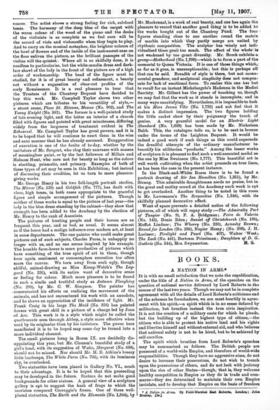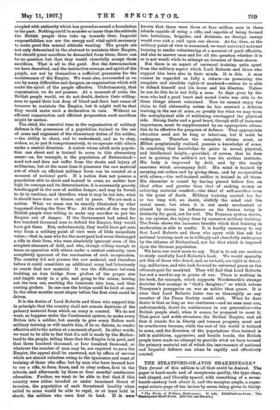BOOKS.
A NATION IN ARMS.* Ix is with no small satisfaction that we note the republication, under the title of A Nation in Arms, of the speeches on the question of national service delivered by Lord Roberts in the course of the last two years. Though we may not be in complete agreement with all the details of Lord Roberts's criticisms and of the schemes he foreshadows, we are most heartily in agree- ment with his spirit,—a spirit which is in no sense defaced by militarism, but breathes instead the true civic inspiration. It is not the creation of a military caste for which he pleads, but the building up of the highest type of citizen,—the citizen who is able to protect his native land and his rights and liberties himself and without external aid, and who believes that national safety is not to be hired, but to be achieved by self-sacrifice.
The spirit which breathes from Lord Roberts's speeches may be summarised as' follows. The British people are possessed of a world-wide Empire, and therefore of world-wide responsibilities. Though they have no aggressive aims, do not desire to increase their possessions, do not wish to trench upon the possessions of others, and do not look with jealousy upon the rise of other States—though,- that is, they welcome healthy competition in Empire as they do- in' trade and com- merce—they are determined to maintain their own Empire inviolate, and to develop that Empire on the basis of freedom.
• d. Nation in Arms. By Fielddlarshal rod Roberta, honclott; Jelin Murray, [la] coupled with authority which has proved so sound a foundation in the past. Nothing could be sounder or saner than theattitude the British people thus take up towards their Imperial responsibilities, nor are the energy and vital spirit.necessary to make good this mental attitude, wanting. The people are not only determined in the abstract to maintain their Empire, but should great sacrifices be demanded from them, there can • be no question but that they would cheerfully accept those sacrifices. That is all- to the • good. But the determination we have described, and•the instinctive eourageand spiritof the people, are not by themselves a sufficient guarantee for the maintenance of the Empire. We want also, surrounded as we are by many difficulties and dangers, an organisation which will make the spirit of the people effective. Unfortunately, that organisation we do not possess. At a moment of crisis the British people would, we do not doubt, declare their willing- ness to spend their last drop of blood and their last ounce of treasure to maintain the Empire, but it might well be that they would make such a declaration in vain. Without an efficient organisation and efficient preparation such sacrifices might be useless.
The chief, the essential item in the organisation of military defence is the possession of a population trained to the use of arms and cognisant of the elementary duties of the soldier, —the ability to shoot, and to understand, and so to obey, orders, or, to put it comprehensively, to co-operate•with others under a central direction. A nation whose adult male popula- tion can shoot and is trained to arms in this elementary sense—as, for example, is the population of .Switzerland— need not and does not suffer from the- strain and injury of militarism, but at the same time it possesses the raw material out of which an efficient military force can -be created at a moment of national peril. If a nation does not possess a population able to shoot and trained to arms, no matter how high its courage and its determination, it is necessarily gravely; handicapped in the case:of sudden danger, and may be forced to do in wartime, and therefore when it may be too late, what it should have done at leisure and in peace. We are such a nation. What we mean can be exactly illustrated by what, happened during the Boer War. At the crisis of the war the British people were willing to make any sacrifice to put the. Empire out of danger. If the Government had asked for five hundred thousand men to defend the Empire, they would have got them. But, unfortunately, they would have got men who from a military point of view were of little immediate value,—that is, men who for the most part had never discharged a rifle in their lives, who were absolutely ignorant even of the simplest elements of drill, and who, though willing enough to learn co-operation with others under a central authority, were completely ignorant of the mechanism of such co-operation. The country did not possess the raw material, and therefore before it could constitute an additional army had laboriously to create that raw materiaL It was the difference between building an iron bridge from girders of the proper size and length ready in a pile, and going to the mines, hewing out the iron ore, smelting the ironstone into iron, and then casting girders. In one case the bridge could be built at once. In the other months must elapse before the first rivet could be driven.
It is the desire of Lord Roberta and those who support him in principle that the country shall not remain destitute of the -primary material from which an army is created. We do not want, as happens under the Continental system, to make every Briton into a soldier, but merely to give every Briton such military training as will enable him, if he so desires, to render effective aid to the nation at a moment of peril. In other words, we want to be able to feel that if a call is made by the Mother- landto the people, telling them that the Empire is in peril, and that three hundred thousand, or four hundred thousand, or whatever the number of men may be, are required to save the Empire, the appeal shall be answered, not by offers of service which are almost valueless owing to the ignorance and want of training of those who offer, but by men who have learned how to use a rifle, to form fours, and to obey orders, first in the schools, and afterwards by three or four months' continuous education. Further, we want to be able to feel that if this country were either invaded or under imminent threat of invasion, the population of each threatened locality when called to arms would be able to repel, or at least hold in eheck, the soldiers who were first to land. If it were
known that there were three or four million men in these islands capable of using a rifle, and capable of being formed into battalions, brigades, and divisions, no .foreign enemy would ever risk a raid upon our shores. As far, then, as the military point of view is concerned, we want universal national training to render volunteering at a moment of peril effective, and also to answer once and for all the question whether it is or is not worth while to attempt an invasion of these shores.
But there is an aspect of universal training quite apart from the military aspect which Lord Roberts and those who support him have also in their minds. It is this. A man cannot be regarded as folly a citizen—as possessing the complete and absolute rights of manhood—unless he is able to defend himself and his home and his 'liberties. Unless he can do this he is not fully a man. • In days gone by the man who had a good heart and sound limbs was able to do these things almost untrained. New he cannot enjoy the claim to full citizenship unless he has received a definite training in the use of arms, so greatly has what we may term the metaphysical side of soldiering overlapped the physical side. Strong limbs and a good heart, though still of immense importance, most be supplemented by an appropriate educa- tion to be effective for purposes of defence. That appropriate education need not be long or laborious, but it must be undergone. Therefore the complete citizen must, as Milton prophetically realised, possess a knowledge of arms. In acquiring that knowledge ,he gains in moral, physical, and intellectual height,—provided, of course, that he does not in gaining the soldier's art lose his civilian instincts. His body is improved by drill, and by the manly exercises which accompany drill. His mind is trained by carrying out orders and by giving them, and by co-operation with others,—the well-trained soldier is trained in all three. His ohmmeter is raised by ;having'.-placed before him an ideal other and greater than that -of making money or achieving material comfork—the -ideal of self-sacrifice even to the point of death. Military training carried too far or too long will, no doubt, stultify the mind and the moral sense, but when it is not made mechanical or abused by excess its influence on the human being is distinctly for• good, not for evil. The Prussian system shows, in our opinion, the injury done by excessive military training. The Swiss shows the immense benefits which that training in moderation is able to confer. It is hardly necessary to say that Lord Roberts and those who agree with him ask for national training such as is willingly and cheerfully undergone by the citizens of Switzerland, not for that which is imposed upon the German population.
We have one word more to say. That is to ask our readers to study carefully Lord Roberts's book. We would specially ask this of those who dread, and, as we hold, are right in dread- ing, militarism, and who look forward to universal peace as the ultimate goal for mankind. They will find that Lord Roberts has not a wordto say in praise of war. There is nothing in his book, for example, which supports Wordsworth's strange doctrine that carnage is " God's daughter," or which echoes Tennyson's panegyrics on war as nobler than peace. It is clear that Lord Roberts bates war as thoroughly as any member of the Peace Society could wish. What he does desire is that as long as war continues—and no sane man can, unfortunately, doubt its continuance in our generation—the British people shall, when it conies, be prepared to meet it. That great and noble structure, the British Empire, and all that it stands for in liberty and human progress, must not be overthrown because, while the rest of the world is trained. to arms, and the direction of the populations thus trained is left in ambitious, aggressive, and hostile hands, the British people have made no attempt to provide what we have termed. the primary material out of which the instruments of national and Imperial defence can alone be rapidly and effectively created.











































 Previous page
Previous page